|
|
|
|
John L. Esposito, Georgetown University
Presidential Address — Public Understanding of Religion and Issues of Religious Pluralism
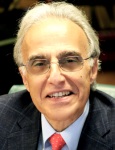 John L. Esposito is the founding director of the Center for Muslim–Christian Understanding: History and International Affairs in the Walsh School of Foreign Service, as well as professor of religion and international affairs and of Islamic studies at Georgetown University. A consultant to the Department of State as well as corporations, universities, and the media worldwide, Esposito specializes in Islam, political Islam, and the impact of Islamic movements from North Africa to Southeast Asia. He has served as President of the Middle East Studies Association of North America and the American Council for the Study of Islamic Societies, and also as Vice Chair of the Center for the Study of Islam. Esposito is a recipient of Pakistan’s Quaid-i-Azzam Award for Outstanding Contributions in Islamic Studies and of the American Academy of Religion’s 2005 Martin E. Marty Award for the Public Understanding of Religion. Esposito’s books and articles have been translated into Arabic, Persian, Urdu, Bahasa Indonesian, Turkish, Japanese, Chinese, and various European languages. He has been interviewed or quoted in The Wall Street Journal, The New York Times, The Washington Post, CNN, ABC Nightline, CBS, NBC, and the BBC, and in newspapers, magazines, and the media in Europe, Asia, and the Middle East. A native of Brooklyn, New York, Esposito currently resides in Washington, D.C., with his wife, Dr. Jeanette P. Esposito. John L. Esposito is the founding director of the Center for Muslim–Christian Understanding: History and International Affairs in the Walsh School of Foreign Service, as well as professor of religion and international affairs and of Islamic studies at Georgetown University. A consultant to the Department of State as well as corporations, universities, and the media worldwide, Esposito specializes in Islam, political Islam, and the impact of Islamic movements from North Africa to Southeast Asia. He has served as President of the Middle East Studies Association of North America and the American Council for the Study of Islamic Societies, and also as Vice Chair of the Center for the Study of Islam. Esposito is a recipient of Pakistan’s Quaid-i-Azzam Award for Outstanding Contributions in Islamic Studies and of the American Academy of Religion’s 2005 Martin E. Marty Award for the Public Understanding of Religion. Esposito’s books and articles have been translated into Arabic, Persian, Urdu, Bahasa Indonesian, Turkish, Japanese, Chinese, and various European languages. He has been interviewed or quoted in The Wall Street Journal, The New York Times, The Washington Post, CNN, ABC Nightline, CBS, NBC, and the BBC, and in newspapers, magazines, and the media in Europe, Asia, and the Middle East. A native of Brooklyn, New York, Esposito currently resides in Washington, D.C., with his wife, Dr. Jeanette P. Esposito.
|
|
|
|
|
|
|
|
|
|
Diana L. Eck, Harvard University
A Lifetime of Learning
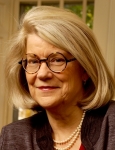 Diana L. Eck is professor of comparative religion and Indian studies at Harvard University and director of the Pluralism Project. As a scholar of India, she has published Banaras: City of Light (Knopf, 1982), Darsan: Seeing the Divine Image in India (Columbia University Press, 1988), and most recently India: A Sacred Geography (Harmony, 2012). As founder and director of the Pluralism Project, Eck has also turned her attention to the United States, producing the award-winning CD-ROM On Common Ground: World Religions in America (Pluralism Project, 2008) and publishing A New Religious America: How A ‘Christian’ Country Has Become the World’s Most Religiously Diverse Nation (HarperOne, 2001). Her book, Encountering God: A Spiritual Journey from Bozeman to Banaras (Beacon Press, 1993),won the 1995 Grawemeyer Book Award. Eck received the National Humanities Medal from President Clinton in 1998 and the American Academy of Religion Martin E. Marty Award for the Public Understanding of Religion in 2002. In 2006, she served as president of the American Academy of Religion. Eck and her spouse, Dorothy Austin, are Masters of Lowell House, one of Harvard’s twelve residential houses for undergraduates. Diana L. Eck is professor of comparative religion and Indian studies at Harvard University and director of the Pluralism Project. As a scholar of India, she has published Banaras: City of Light (Knopf, 1982), Darsan: Seeing the Divine Image in India (Columbia University Press, 1988), and most recently India: A Sacred Geography (Harmony, 2012). As founder and director of the Pluralism Project, Eck has also turned her attention to the United States, producing the award-winning CD-ROM On Common Ground: World Religions in America (Pluralism Project, 2008) and publishing A New Religious America: How A ‘Christian’ Country Has Become the World’s Most Religiously Diverse Nation (HarperOne, 2001). Her book, Encountering God: A Spiritual Journey from Bozeman to Banaras (Beacon Press, 1993),won the 1995 Grawemeyer Book Award. Eck received the National Humanities Medal from President Clinton in 1998 and the American Academy of Religion Martin E. Marty Award for the Public Understanding of Religion in 2002. In 2006, she served as president of the American Academy of Religion. Eck and her spouse, Dorothy Austin, are Masters of Lowell House, one of Harvard’s twelve residential houses for undergraduates. |
|
|
|
|
|
|
|
|
|
Karen Armstrong, Charter for Compassion
The Science of Compassion
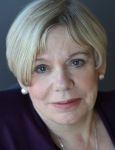 Karen Armstrong is the author of numerous books on religious affairs, including A History of God: The 4,000-Year Quest of Judaism, Christianity, and Islam (Knopf, 1994), The Battle for God (Knopf, 2000), Holy War: The Crusades and Their Impact on Today’s World (Doubleday, 1991), Islam: A Short History (Modern Library, 2002), The Great Transformation: The Beginning of Our Religious Traditions (Knopf, 2006), The Bible: The Biography (Atlantic Monthly Press, 2007), The Case for God (Knopf, 2009), and most recently Twelve Steps to a Compassionate Life (Knopf, 2010). Armstrong has also written two memoirs, Through the Narrow Gate: A Memoir of Spiritual Discovery (Saint Martin, 2005) and The Spiral Staircase: My Climb Out of Darkness (Knopf, 2004). Her work has been translated into forty-five languages. She has addressed members of the U.S. Congress on three occasions, lectured to policy-makers at the U.S. State and Defense Departments, participated in the World Economic Forum, addressed the Council on Foreign Relations in Washington and New York, and is an ambassador for the U.N. Alliance of Civilizations. Armstrong speaks regularly in Muslim countries, most notably in Pakistan, Malaysia, Singapore, and Turkey. In 2007, she was awarded a medal for her services to Islam by the prestigious Al-Azhar Madrassah — the first foreigner to have been awarded this decoration. In 2009, Armstrong was presented with the Four Freedoms Medal for Freedom of Worship by the Franklin and Eleanor Roosevelt Institute as well as the Dr. Leopald Lucas Prize at Tubingen University. She is a trustee of the British Museum and a fellow of the Royal Academy of Literature. In February 2008, Armstrong was awarded the TED Prize and is currently working with TED on a major international project to propagate the Charter for Compassion (www.charterforcompassion.org), which was crafted by leading thinkers in six of the world’s religions and is now being implemented practically, realistically, and creatively in the United States, Netherlands, and the Middle East, especially Pakistan. Karen Armstrong is the author of numerous books on religious affairs, including A History of God: The 4,000-Year Quest of Judaism, Christianity, and Islam (Knopf, 1994), The Battle for God (Knopf, 2000), Holy War: The Crusades and Their Impact on Today’s World (Doubleday, 1991), Islam: A Short History (Modern Library, 2002), The Great Transformation: The Beginning of Our Religious Traditions (Knopf, 2006), The Bible: The Biography (Atlantic Monthly Press, 2007), The Case for God (Knopf, 2009), and most recently Twelve Steps to a Compassionate Life (Knopf, 2010). Armstrong has also written two memoirs, Through the Narrow Gate: A Memoir of Spiritual Discovery (Saint Martin, 2005) and The Spiral Staircase: My Climb Out of Darkness (Knopf, 2004). Her work has been translated into forty-five languages. She has addressed members of the U.S. Congress on three occasions, lectured to policy-makers at the U.S. State and Defense Departments, participated in the World Economic Forum, addressed the Council on Foreign Relations in Washington and New York, and is an ambassador for the U.N. Alliance of Civilizations. Armstrong speaks regularly in Muslim countries, most notably in Pakistan, Malaysia, Singapore, and Turkey. In 2007, she was awarded a medal for her services to Islam by the prestigious Al-Azhar Madrassah — the first foreigner to have been awarded this decoration. In 2009, Armstrong was presented with the Four Freedoms Medal for Freedom of Worship by the Franklin and Eleanor Roosevelt Institute as well as the Dr. Leopald Lucas Prize at Tubingen University. She is a trustee of the British Museum and a fellow of the Royal Academy of Literature. In February 2008, Armstrong was awarded the TED Prize and is currently working with TED on a major international project to propagate the Charter for Compassion (www.charterforcompassion.org), which was crafted by leading thinkers in six of the world’s religions and is now being implemented practically, realistically, and creatively in the United States, Netherlands, and the Middle East, especially Pakistan.
Plenary Abstract:
“The Science of Compassion” I found this phrase in a footnote and it has changed the way I think and write about religion. It should also challenge the way we approach our subject and the spirit in which we conduct our debates and disagreements. But the science of compassion has also compelled me, somewhat reluctantly as I am an anchorite by nature, into the public arena. At this juncture of history, scholars of religion have a responsibility to shed light on the problems of our polarized world in a way that is helpful to the general public. I almost called my talk “Confessions of a Popularizer” — a notion that is, I know, anathema to many in the academy. Yet religion cannot simply be a scholarly or antiquarian exercise and the science of compassion is not just a nice idea — it is an urgent global imperative.
|
|
|
|
|
|
Plenary Panel: Public Understanding of Religion and Issues of Religious Pluralism
Shaun Casey, Wesley Theological Seminary
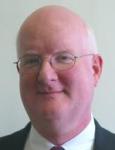 Shaun Casey is professor of Christian ethics and director of the National Capital Semester for Seminarians (NCSS) at Wesley Theological Seminary in Washington, DC. He served as senior advisor for religious affairs for the Obama campaign and was a member of the Faith Outreach staff for the 2008 presidential campaign. His research interests include ethics and international affairs, the public implications of religious belief, and the intersection of religion and politics. Casey has written on the ethics of the war in Iraq as well the role of religion in American presidential politics. His book, The Making of a Catholic President: Kennedy vs. Nixon 1960, was published by Oxford University Press in 2009. He is currently working on two writing projects. He is coediting the Oxford Handbook of Political Theology with Michael Kessler of Georgetown University and writing a book on ethics and international politics tentatively titled Niebuhr’s Children. Casey is a graduate of Harvard Divinity School with a Master of Divinity degree and a Doctor of Theology in religion and society. He also earned a Master of Public Administration from the Kennedy School of Government at Harvard University with a concentration in international security. He earned a Bachelor of Arts degree from Abilene Christian University. Casey is a member of the American Academy of Religion and serves as chair of its Public Understanding of Religion Committee. He was a visiting scholar at the Center for American Progress and a subject matter expert at the Center for Strategic and International Studies. Shaun Casey is professor of Christian ethics and director of the National Capital Semester for Seminarians (NCSS) at Wesley Theological Seminary in Washington, DC. He served as senior advisor for religious affairs for the Obama campaign and was a member of the Faith Outreach staff for the 2008 presidential campaign. His research interests include ethics and international affairs, the public implications of religious belief, and the intersection of religion and politics. Casey has written on the ethics of the war in Iraq as well the role of religion in American presidential politics. His book, The Making of a Catholic President: Kennedy vs. Nixon 1960, was published by Oxford University Press in 2009. He is currently working on two writing projects. He is coediting the Oxford Handbook of Political Theology with Michael Kessler of Georgetown University and writing a book on ethics and international politics tentatively titled Niebuhr’s Children. Casey is a graduate of Harvard Divinity School with a Master of Divinity degree and a Doctor of Theology in religion and society. He also earned a Master of Public Administration from the Kennedy School of Government at Harvard University with a concentration in international security. He earned a Bachelor of Arts degree from Abilene Christian University. Casey is a member of the American Academy of Religion and serves as chair of its Public Understanding of Religion Committee. He was a visiting scholar at the Center for American Progress and a subject matter expert at the Center for Strategic and International Studies.
Ingrid Mattson, University of Western Ontario
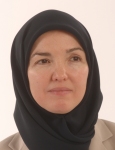 Ingrid Mattson is the London and Windsor Community Chair of Islamic Studies at Huron University College at the University of Western Ontario in Canada. She earned her PhD in Near Eastern Languages and Civilizations from the University of Chicago in 1999 and a BA in philosophy and fine arts from the University of Waterloo, Ontario, in 1987. Before coming to Huron University, she founded the Islamic Chaplaincy program and was Director of the Macdonald Center for Islamic Studies and Christian–Muslim Relations at Hartford Seminary in Connecticut. She is the author of The Story of the Qur’an: Its History and Place in Muslim Life (Wiley Blackwell, 2007) as well as numerous articles exploring Islamic ethics in contemporary Muslim communities. Mattson is an internationally recognized Islamic scholar. From 2006–2010, she served as president of the Islamic Society of North America (ISNA) and had previously served two terms as Vice President. She is frequently consulted by media, government, and civic organizations and has served as an expert witness. Ingrid Mattson is the London and Windsor Community Chair of Islamic Studies at Huron University College at the University of Western Ontario in Canada. She earned her PhD in Near Eastern Languages and Civilizations from the University of Chicago in 1999 and a BA in philosophy and fine arts from the University of Waterloo, Ontario, in 1987. Before coming to Huron University, she founded the Islamic Chaplaincy program and was Director of the Macdonald Center for Islamic Studies and Christian–Muslim Relations at Hartford Seminary in Connecticut. She is the author of The Story of the Qur’an: Its History and Place in Muslim Life (Wiley Blackwell, 2007) as well as numerous articles exploring Islamic ethics in contemporary Muslim communities. Mattson is an internationally recognized Islamic scholar. From 2006–2010, she served as president of the Islamic Society of North America (ISNA) and had previously served two terms as Vice President. She is frequently consulted by media, government, and civic organizations and has served as an expert witness.
Josef Sorett, Columbia University
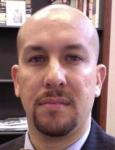 Josef Sorett is an assistant professor of Religion and African-American Studies at Columbia University. As an interdisciplinary scholar of religion and race in the Americas, Sorett employs primarily historical and literary approaches to the study of black communities and cultures in the United States. He has a special interest in how ideas about religion inform broader conversations about culture and society and how such ideas emerge and take shape in (discursive and physical) spaces typically assumed to be outside the provenance of "religion." His current research addresses two central questions: 1) How has religion been imagined in literature, the arts, and popular culture?; and 2) What is the relationship between the cultures of religious institutions (especially churches) and American public life? He has published essays and reviews in Culture and Religion, Callaloo, the Journal for the Scientific Study of Religion, and PNEUMA: Journal of the Society for Pentecostal Studies; and his writing and commentary have appeared in such popular media outlets ABC News, the New York Times, and the Washington Post, as well as on the BBC and NPR. He is currently working on two book projects: a monograph, Spirit in the Dark: A Religious History of Racial Aesthetics (Oxford University Press, forthcoming); and an anthology, which is tentatively titled The Sexual Politics of Black Churches. Sorett received his PhD from Harvard University and he holds a BS from Oral Roberts University and an MDiv from Boston University. Alongside his academic pursuits, Sorett maintains a commitment to public service and has over a decade of experience serving in research and advisory capacities with nonprofit and policy organizations. He is currently a member of AAR’s Public Understanding of Religion Committee. Josef Sorett is an assistant professor of Religion and African-American Studies at Columbia University. As an interdisciplinary scholar of religion and race in the Americas, Sorett employs primarily historical and literary approaches to the study of black communities and cultures in the United States. He has a special interest in how ideas about religion inform broader conversations about culture and society and how such ideas emerge and take shape in (discursive and physical) spaces typically assumed to be outside the provenance of "religion." His current research addresses two central questions: 1) How has religion been imagined in literature, the arts, and popular culture?; and 2) What is the relationship between the cultures of religious institutions (especially churches) and American public life? He has published essays and reviews in Culture and Religion, Callaloo, the Journal for the Scientific Study of Religion, and PNEUMA: Journal of the Society for Pentecostal Studies; and his writing and commentary have appeared in such popular media outlets ABC News, the New York Times, and the Washington Post, as well as on the BBC and NPR. He is currently working on two book projects: a monograph, Spirit in the Dark: A Religious History of Racial Aesthetics (Oxford University Press, forthcoming); and an anthology, which is tentatively titled The Sexual Politics of Black Churches. Sorett received his PhD from Harvard University and he holds a BS from Oral Roberts University and an MDiv from Boston University. Alongside his academic pursuits, Sorett maintains a commitment to public service and has over a decade of experience serving in research and advisory capacities with nonprofit and policy organizations. He is currently a member of AAR’s Public Understanding of Religion Committee.
|
![PDF-NOTE: Internet Explorer Users, right click the PDF Icon and choose [save target as] if you are experiencing problems with clicking.](http://rsnonline.org/templates/rsntemplate-smallmasthead/images/pdf_button.png)



 John L. Esposito is the founding director of the Center for Muslim–Christian Understanding: History and International Affairs in the Walsh School of Foreign Service, as well as professor of religion and international affairs and of Islamic studies at Georgetown University. A consultant to the Department of State as well as corporations, universities, and the media worldwide, Esposito specializes in Islam, political Islam, and the impact of Islamic movements from North Africa to Southeast Asia. He has served as President of the Middle East Studies Association of North America and the American Council for the Study of Islamic Societies, and also as Vice Chair of the Center for the Study of Islam. Esposito is a recipient of Pakistan’s Quaid-i-Azzam Award for Outstanding Contributions in Islamic Studies and of the American Academy of Religion’s 2005 Martin E. Marty Award for the Public Understanding of Religion. Esposito’s books and articles have been translated into Arabic, Persian, Urdu, Bahasa Indonesian, Turkish, Japanese, Chinese, and various European languages. He has been interviewed or quoted in The Wall Street Journal, The New York Times, The Washington Post, CNN, ABC Nightline, CBS, NBC, and the BBC, and in newspapers, magazines, and the media in Europe, Asia, and the Middle East. A native of Brooklyn, New York, Esposito currently resides in Washington, D.C., with his wife, Dr. Jeanette P. Esposito.
John L. Esposito is the founding director of the Center for Muslim–Christian Understanding: History and International Affairs in the Walsh School of Foreign Service, as well as professor of religion and international affairs and of Islamic studies at Georgetown University. A consultant to the Department of State as well as corporations, universities, and the media worldwide, Esposito specializes in Islam, political Islam, and the impact of Islamic movements from North Africa to Southeast Asia. He has served as President of the Middle East Studies Association of North America and the American Council for the Study of Islamic Societies, and also as Vice Chair of the Center for the Study of Islam. Esposito is a recipient of Pakistan’s Quaid-i-Azzam Award for Outstanding Contributions in Islamic Studies and of the American Academy of Religion’s 2005 Martin E. Marty Award for the Public Understanding of Religion. Esposito’s books and articles have been translated into Arabic, Persian, Urdu, Bahasa Indonesian, Turkish, Japanese, Chinese, and various European languages. He has been interviewed or quoted in The Wall Street Journal, The New York Times, The Washington Post, CNN, ABC Nightline, CBS, NBC, and the BBC, and in newspapers, magazines, and the media in Europe, Asia, and the Middle East. A native of Brooklyn, New York, Esposito currently resides in Washington, D.C., with his wife, Dr. Jeanette P. Esposito. Diana L. Eck is professor of comparative religion and Indian studies at Harvard University and director of the Pluralism Project. As a scholar of India, she has published Banaras: City of Light (Knopf, 1982), Darsan: Seeing the Divine Image in India (Columbia University Press, 1988), and most recently India: A Sacred Geography (Harmony, 2012). As founder and director of the Pluralism Project, Eck has also turned her attention to the United States, producing the award-winning CD-ROM On Common Ground: World Religions in America (Pluralism Project, 2008) and publishing A New Religious America: How A ‘Christian’ Country Has Become the World’s Most Religiously Diverse Nation (HarperOne, 2001). Her book, Encountering God: A Spiritual Journey from Bozeman to Banaras (Beacon Press, 1993),won the 1995 Grawemeyer Book Award. Eck received the National Humanities Medal from President Clinton in 1998 and the American Academy of Religion Martin E. Marty Award for the Public Understanding of Religion in 2002. In 2006, she served as president of the American Academy of Religion. Eck and her spouse, Dorothy Austin, are Masters of Lowell House, one of Harvard’s twelve residential houses for undergraduates.
Diana L. Eck is professor of comparative religion and Indian studies at Harvard University and director of the Pluralism Project. As a scholar of India, she has published Banaras: City of Light (Knopf, 1982), Darsan: Seeing the Divine Image in India (Columbia University Press, 1988), and most recently India: A Sacred Geography (Harmony, 2012). As founder and director of the Pluralism Project, Eck has also turned her attention to the United States, producing the award-winning CD-ROM On Common Ground: World Religions in America (Pluralism Project, 2008) and publishing A New Religious America: How A ‘Christian’ Country Has Become the World’s Most Religiously Diverse Nation (HarperOne, 2001). Her book, Encountering God: A Spiritual Journey from Bozeman to Banaras (Beacon Press, 1993),won the 1995 Grawemeyer Book Award. Eck received the National Humanities Medal from President Clinton in 1998 and the American Academy of Religion Martin E. Marty Award for the Public Understanding of Religion in 2002. In 2006, she served as president of the American Academy of Religion. Eck and her spouse, Dorothy Austin, are Masters of Lowell House, one of Harvard’s twelve residential houses for undergraduates. Karen Armstrong is the author of numerous books on religious affairs, including A History of God: The 4,000-Year Quest of Judaism, Christianity, and Islam (Knopf, 1994), The Battle for God (Knopf, 2000), Holy War: The Crusades and Their Impact on Today’s World (Doubleday, 1991), Islam: A Short History (Modern Library, 2002), The Great Transformation: The Beginning of Our Religious Traditions (Knopf, 2006), The Bible: The Biography (Atlantic Monthly Press, 2007), The Case for God (Knopf, 2009), and most recently Twelve Steps to a Compassionate Life (Knopf, 2010). Armstrong has also written two memoirs, Through the Narrow Gate: A Memoir of Spiritual Discovery (Saint Martin, 2005) and The Spiral Staircase: My Climb Out of Darkness (Knopf, 2004). Her work has been translated into forty-five languages. She has addressed members of the U.S. Congress on three occasions, lectured to policy-makers at the U.S. State and Defense Departments, participated in the World Economic Forum, addressed the Council on Foreign Relations in Washington and New York, and is an ambassador for the U.N. Alliance of Civilizations. Armstrong speaks regularly in Muslim countries, most notably in Pakistan, Malaysia, Singapore, and Turkey. In 2007, she was awarded a medal for her services to Islam by the prestigious Al-Azhar Madrassah — the first foreigner to have been awarded this decoration. In 2009, Armstrong was presented with the Four Freedoms Medal for Freedom of Worship by the Franklin and Eleanor Roosevelt Institute as well as the Dr. Leopald Lucas Prize at Tubingen University. She is a trustee of the British Museum and a fellow of the Royal Academy of Literature. In February 2008, Armstrong was awarded the TED Prize and is currently working with TED on a major international project to propagate the Charter for Compassion (
Karen Armstrong is the author of numerous books on religious affairs, including A History of God: The 4,000-Year Quest of Judaism, Christianity, and Islam (Knopf, 1994), The Battle for God (Knopf, 2000), Holy War: The Crusades and Their Impact on Today’s World (Doubleday, 1991), Islam: A Short History (Modern Library, 2002), The Great Transformation: The Beginning of Our Religious Traditions (Knopf, 2006), The Bible: The Biography (Atlantic Monthly Press, 2007), The Case for God (Knopf, 2009), and most recently Twelve Steps to a Compassionate Life (Knopf, 2010). Armstrong has also written two memoirs, Through the Narrow Gate: A Memoir of Spiritual Discovery (Saint Martin, 2005) and The Spiral Staircase: My Climb Out of Darkness (Knopf, 2004). Her work has been translated into forty-five languages. She has addressed members of the U.S. Congress on three occasions, lectured to policy-makers at the U.S. State and Defense Departments, participated in the World Economic Forum, addressed the Council on Foreign Relations in Washington and New York, and is an ambassador for the U.N. Alliance of Civilizations. Armstrong speaks regularly in Muslim countries, most notably in Pakistan, Malaysia, Singapore, and Turkey. In 2007, she was awarded a medal for her services to Islam by the prestigious Al-Azhar Madrassah — the first foreigner to have been awarded this decoration. In 2009, Armstrong was presented with the Four Freedoms Medal for Freedom of Worship by the Franklin and Eleanor Roosevelt Institute as well as the Dr. Leopald Lucas Prize at Tubingen University. She is a trustee of the British Museum and a fellow of the Royal Academy of Literature. In February 2008, Armstrong was awarded the TED Prize and is currently working with TED on a major international project to propagate the Charter for Compassion ( Shaun Casey is professor of Christian ethics and director of the National Capital Semester for Seminarians (NCSS) at Wesley Theological Seminary in Washington, DC. He served as senior advisor for religious affairs for the Obama campaign and was a member of the Faith Outreach staff for the 2008 presidential campaign. His research interests include ethics and international affairs, the public implications of religious belief, and the intersection of religion and politics. Casey has written on the ethics of the war in Iraq as well the role of religion in American presidential politics. His book, The Making of a Catholic President: Kennedy vs. Nixon 1960, was published by Oxford University Press in 2009. He is currently working on two writing projects. He is coediting the Oxford Handbook of Political Theology with Michael Kessler of Georgetown University and writing a book on ethics and international politics tentatively titled Niebuhr’s Children. Casey is a graduate of Harvard Divinity School with a Master of Divinity degree and a Doctor of Theology in religion and society. He also earned a Master of Public Administration from the Kennedy School of Government at Harvard University with a concentration in international security. He earned a Bachelor of Arts degree from Abilene Christian University. Casey is a member of the American Academy of Religion and serves as chair of its Public Understanding of Religion Committee. He was a visiting scholar at the Center for American Progress and a subject matter expert at the Center for Strategic and International Studies.
Shaun Casey is professor of Christian ethics and director of the National Capital Semester for Seminarians (NCSS) at Wesley Theological Seminary in Washington, DC. He served as senior advisor for religious affairs for the Obama campaign and was a member of the Faith Outreach staff for the 2008 presidential campaign. His research interests include ethics and international affairs, the public implications of religious belief, and the intersection of religion and politics. Casey has written on the ethics of the war in Iraq as well the role of religion in American presidential politics. His book, The Making of a Catholic President: Kennedy vs. Nixon 1960, was published by Oxford University Press in 2009. He is currently working on two writing projects. He is coediting the Oxford Handbook of Political Theology with Michael Kessler of Georgetown University and writing a book on ethics and international politics tentatively titled Niebuhr’s Children. Casey is a graduate of Harvard Divinity School with a Master of Divinity degree and a Doctor of Theology in religion and society. He also earned a Master of Public Administration from the Kennedy School of Government at Harvard University with a concentration in international security. He earned a Bachelor of Arts degree from Abilene Christian University. Casey is a member of the American Academy of Religion and serves as chair of its Public Understanding of Religion Committee. He was a visiting scholar at the Center for American Progress and a subject matter expert at the Center for Strategic and International Studies. Ingrid Mattson is the London and Windsor Community Chair of Islamic Studies at Huron University College at the University of Western Ontario in Canada. She earned her PhD in Near Eastern Languages and Civilizations from the University of Chicago in 1999 and a BA in philosophy and fine arts from the University of Waterloo, Ontario, in 1987. Before coming to Huron University, she founded the Islamic Chaplaincy program and was Director of the Macdonald Center for Islamic Studies and Christian–Muslim Relations at Hartford Seminary in Connecticut. She is the author of The Story of the Qur’an: Its History and Place in Muslim Life (Wiley Blackwell, 2007) as well as numerous articles exploring Islamic ethics in contemporary Muslim communities. Mattson is an internationally recognized Islamic scholar. From 2006–2010, she served as president of the Islamic Society of North America (ISNA) and had previously served two terms as Vice President. She is frequently consulted by media, government, and civic organizations and has served as an expert witness.
Ingrid Mattson is the London and Windsor Community Chair of Islamic Studies at Huron University College at the University of Western Ontario in Canada. She earned her PhD in Near Eastern Languages and Civilizations from the University of Chicago in 1999 and a BA in philosophy and fine arts from the University of Waterloo, Ontario, in 1987. Before coming to Huron University, she founded the Islamic Chaplaincy program and was Director of the Macdonald Center for Islamic Studies and Christian–Muslim Relations at Hartford Seminary in Connecticut. She is the author of The Story of the Qur’an: Its History and Place in Muslim Life (Wiley Blackwell, 2007) as well as numerous articles exploring Islamic ethics in contemporary Muslim communities. Mattson is an internationally recognized Islamic scholar. From 2006–2010, she served as president of the Islamic Society of North America (ISNA) and had previously served two terms as Vice President. She is frequently consulted by media, government, and civic organizations and has served as an expert witness. Josef Sorett is an assistant professor of Religion and African-American Studies at Columbia University. As an interdisciplinary scholar of religion and race in the Americas, Sorett employs primarily historical and literary approaches to the study of black communities and cultures in the United States. He has a special interest in how ideas about religion inform broader conversations about culture and society and how such ideas emerge and take shape in (discursive and physical) spaces typically assumed to be outside the provenance of "religion." His current research addresses two central questions: 1) How has religion been imagined in literature, the arts, and popular culture?; and 2) What is the relationship between the cultures of religious institutions (especially churches) and American public life? He has published essays and reviews in Culture and Religion, Callaloo, the Journal for the Scientific Study of Religion, and PNEUMA: Journal of the Society for Pentecostal Studies; and his writing and commentary have appeared in such popular media outlets ABC News, the New York Times, and the Washington Post, as well as on the BBC and NPR. He is currently working on two book projects: a monograph, Spirit in the Dark: A Religious History of Racial Aesthetics (Oxford University Press, forthcoming); and an anthology, which is tentatively titled The Sexual Politics of Black Churches. Sorett received his PhD from Harvard University and he holds a BS from Oral Roberts University and an MDiv from Boston University. Alongside his academic pursuits, Sorett maintains a commitment to public service and has over a decade of experience serving in research and advisory capacities with nonprofit and policy organizations. He is currently a member of AAR’s Public Understanding of Religion Committee.
Josef Sorett is an assistant professor of Religion and African-American Studies at Columbia University. As an interdisciplinary scholar of religion and race in the Americas, Sorett employs primarily historical and literary approaches to the study of black communities and cultures in the United States. He has a special interest in how ideas about religion inform broader conversations about culture and society and how such ideas emerge and take shape in (discursive and physical) spaces typically assumed to be outside the provenance of "religion." His current research addresses two central questions: 1) How has religion been imagined in literature, the arts, and popular culture?; and 2) What is the relationship between the cultures of religious institutions (especially churches) and American public life? He has published essays and reviews in Culture and Religion, Callaloo, the Journal for the Scientific Study of Religion, and PNEUMA: Journal of the Society for Pentecostal Studies; and his writing and commentary have appeared in such popular media outlets ABC News, the New York Times, and the Washington Post, as well as on the BBC and NPR. He is currently working on two book projects: a monograph, Spirit in the Dark: A Religious History of Racial Aesthetics (Oxford University Press, forthcoming); and an anthology, which is tentatively titled The Sexual Politics of Black Churches. Sorett received his PhD from Harvard University and he holds a BS from Oral Roberts University and an MDiv from Boston University. Alongside his academic pursuits, Sorett maintains a commitment to public service and has over a decade of experience serving in research and advisory capacities with nonprofit and policy organizations. He is currently a member of AAR’s Public Understanding of Religion Committee.